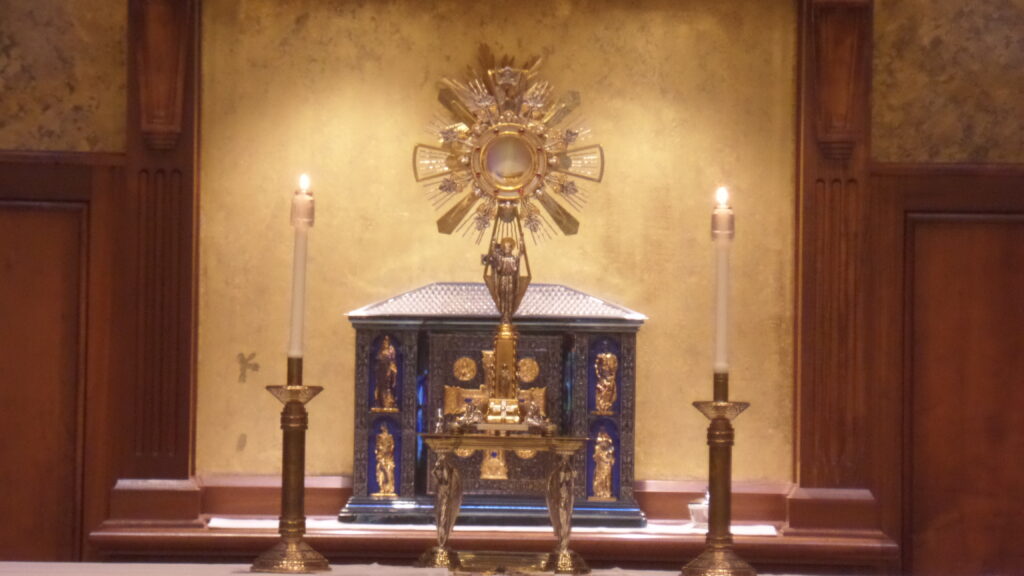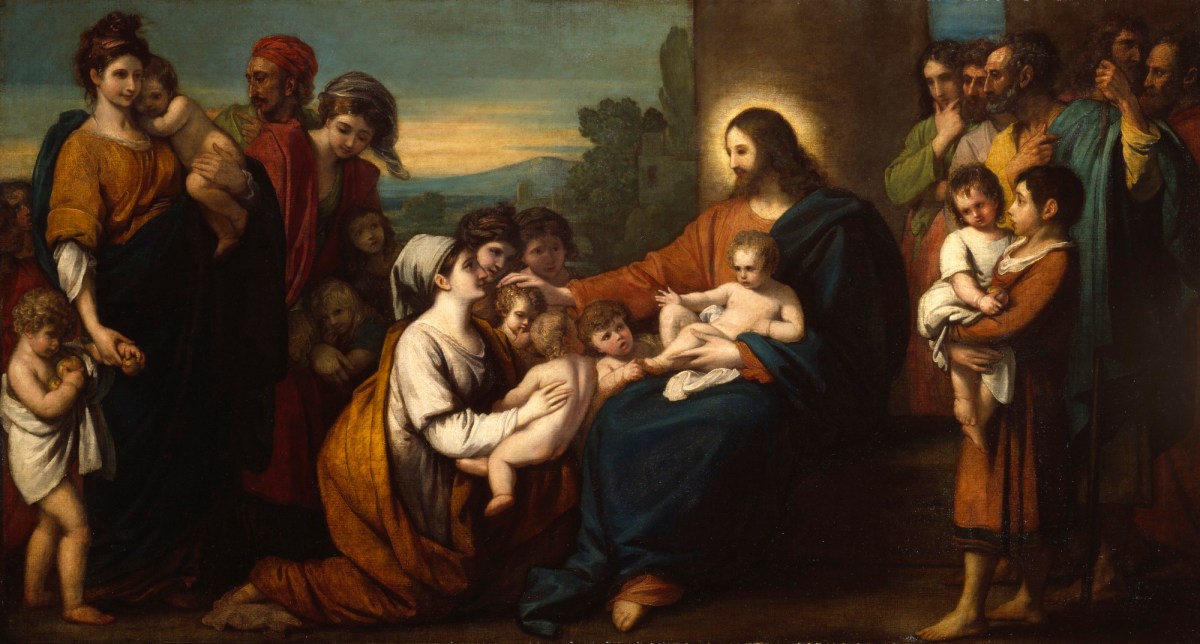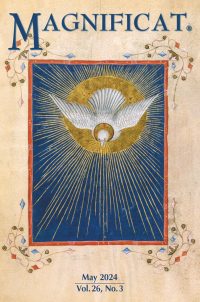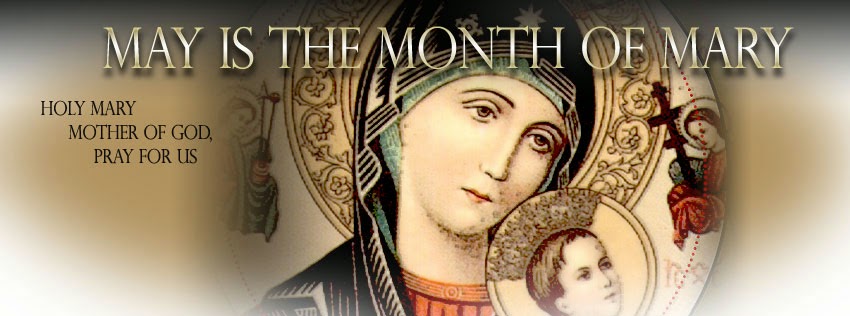
Catena Aurea by St. Thomas Aguinas
Mark CHAP. 10
10:13–16
13. And they brought young children to him, that he should touch them: and his disciples rebuked those that brought them.
14. But when Jesus saw it, he was much displeased, and said unto them, Suffer the little children to come unto me, and forbid them not: for of such is the kingdom of God.
15. Verily I say unto you, Whosoever shall not receive the kingdom of God as a little child, he shall not enter therein.
16. And he took them up in his arms, put his hands upon them, and blessed them.
THEOPHYLACT. The wickedness of the Pharisees in tempting Christ, has been related above, and now is shewn the great faith of the multitude, who believed that Christ conferred a blessing on the children whom they brought to Him, by the mere laying on of His hands. Wherefore it is said: And they brought young children to him, that he might touch them.
CHRYSOSTOM. (ubi sup.) But the disciples, out of regard for the dignity of Christ, forbade those who brought them. And this is what is added: And his disciples rebuked those who brought them. But our Saviour, in order to teach His disciples to be modest in their ideas, and to tread under foot worldly pride, takes the children to Him, and assigns to them the kingdom of God: wherefore it goes on: And he said unto them, Suffer little children to come unto me, and forbid them not.
ORIGEN. (Matt. tom. xv. 7) If any of those who profess to hold the office of teaching1 in the Church should see a person bringing to them some of the foolish of this world, and low born, and weak, who for this reason are called children and infants, let him not forbid the man who offers such an one to the Saviour, as though he were acting without judgment. After this He exhorts those of His disciples who are already grown to full stature to condescend to be useful to children, that they may become to children as children, that they may gain children; for He Himself, when He was in the form of God, humbled Himself, and became a child. On which He adds: For of such is the kingdom of heaven. (1 Cor. 9:22)
CHRYSOSTOM. (ubi sup.) For indeed the mind of a child is pure from all passions, for which reason, we ought by free choice to do those works, which children have by nature.
THEOPHYLACT. Wherefore He says not, for of these, but of such is the kingdom of God, that is, of persons who have both in their intention and their work the harmlessness and simplicity which children have by nature. For a child does not hate, does nothing of evil intent, nor though beaten does he quit his mother; and though she clothe him in vile garments, prefers them to kingly apparel; in like manner he, who lives according to the good ways of his mother the Church, honours nothing before her, nay, not pleasure, which is the queen of many; wherefore also the Lord subjoins, Verily I say unto you, Whosoever shall not receive the kingdom of God as a little child, he shall not enter therein.
BEDE. (ubi sup.) That is, if ye have not innocence and purity of mind like that of children, ye cannot enter into the kingdom of heaven. Or else, we are ordered to receive the kingdom of God, that is, the doctrine of the Gospel, as a little child, because as a child, when he is taught, does not contradict his teachers, nor put together reasonings and words against them, but receives with faith what they teach, and obeys them with awe, so we also are to receive the word of the Lord with simple obedience, and without any gainsaying. It goes on: And he took them up in his arms, put his hands upon them, and blessed them.
PSEUDO-CHRYSOSTOM. (Vict. Ant. e Cat. in Marc.) Fitly does He take them up into His arms to bless them, as it were, lifting into His own bosom, and reconciling Himself to His creation, which in the beginning fell from Him, and was separated from Him. Again, He puts His hands upon the children, to teach us the working of His divine power; and indeed, He puts His hands upon them, as others are wont to do, though His operation is not as that of others, for though He was God, He kept to human ways of acting, as being very man.
BEDE. (ubi sup.) Having embraced the children, He also blessed them, implying that the lowly in spirit are worthy of His blessing, grace, and love.
Catena Aurea Mark 10
Saint of the Day for May 25
(c. 672 – May 25, 735)
Saint Bede the Venerable’s Story
Bede is one of the few saints honored as such even during his lifetime. His writings were filled with such faith and learning that even while he was still alive, a Church council ordered them to be read publicly in the churches.
At an early age, Bede was entrusted to the care of the abbot of the Monastery of St. Paul, Jarrow. The happy combination of genius and the instruction of scholarly, saintly monks, produced a saint and an extraordinary scholar, perhaps the most outstanding one of his day. He was deeply versed in all the sciences of his times: natural philosophy, the philosophical principles of Aristotle, astronomy, arithmetic, grammar, ecclesiastical history, the lives of the saints and especially, holy Scripture.
From the time of his ordination to the priesthood at 30—he had been ordained a deacon at 19—till his death, Bede was ever occupied with learning, writing, and teaching. Besides the many books that he copied, he composed 45 of his own, including 30 commentaries on books of the Bible.
His Ecclesiastical History of the English People is commonly regarded as of decisive importance in the art and science of writing history. A unique era was coming to an end at the time of Bede’s death: It had fulfilled its purpose of preparing Western Christianity to assimilate the non-Roman barbarian North. Bede recognized the opening to a new day in the life of the Church even as it was happening.
Although eagerly sought by kings and other notables, even Pope Sergius, Bede managed to remain in his own monastery until his death. Only once did he leave for a few months in order to teach in the school of the archbishop of York. Bede died in 735 praying his favorite prayer: “Glory be to the Father, and to the Son, and to the Holy Spirit. As in the beginning, so now, and forever.”
Reflection
Though his History is the greatest legacy Bede has left us, his work in all the sciences, especially in Scripture, should not be overlooked. During his last Lent, Bede worked on a translation of the Gospel of Saint John into English, completing it the day he died. But of this work “to break the word to the poor and unlearned” nothing remains today.
Saint Bede the Venerable is the Patron Saint of:
Scholars
franciscanmedia.org
NAVARRE BIBLE COMMENTARY (RSV)
Ad Majorem Dei Gloriam (To the Greater Glory of God)
First Reading:
From: James 5:13-20
The Value of Prayer. The Sacrament of the Anointing of the Sick (Continuation)
-----------------------------------------------------------------------------
[13] Is any one among you suffering? Let him pray. Is any cheerful? Let him sing praise. [14] Is any among you sick? Let him call for the elders of the church, and let them pray over him, anointing him with oil in the name of the Lord; [15] and the prayer of faith will save the sick man, and the Lord will raise him up; and if he has committed sins, he will be forgiven. [16] Therefore confess your sins to one another, and pray for one another, that you may be healed. The prayer of a righteous man has great power in its effects. [17] Elijah was a man of like nature with ourselves and he prayed fervently that it might not rain, and for three years and six months it did not rain on the earth. [18] Then he prayed again and the heaven gave rain, and the earth brought forth its fruit.
Concern for One Another
-----------------------
[19] My brethren, if any one among you wanders from the truth and some one brings him back, [20] let him know that whoever brings back a sinner from the error of his way will save his soul from death and will cover a multitude of sins.
***********************************************************************
Commentary:
13-18. In this final counsels, St James has most to say on the subject of prayer. He teaches that it is a necessary and effective counter to sadness (“suffering": v. 13); the prayer of priests, while anointing the sick with oil, is the sacrament of Anointing (vv. 14-15); prayer for others helps bring forgiveness of sins (v. 16). All this is supported by the example of Elijah (vv. 17-18).
13. “Suffering”: the Greek word, which can be translated as “experiencing sadness”, includes the idea of suffering under some evil, so the “sadness” can be taken as some type of affliction, or sickness of the soul.
St Bede describes the attitude a Christian should adopt when he or she feels overwhelmed by the “pest” of sadness, regardless of its cause: “Have recourse to the Church; kneel in prayer before the Lord, asking him to send the grace of his consolation, and do not imbibe the world’s sadness, which only leads to death” ("Super Iac. Expositio, Ad Loc",). Sadness, gloominess, is a powerful ally of the devil and one of the subtlest weapons he uses to lead a person to commit sin; one needs to react against it immediately.
“Being children of God, how can we be sad? Sadness is the end product of selfishness. If we truly want to live for God, we will never lack joy, even when we discover our errors and wretchedness. Cheerfulness finds its way out into our life of prayer, so much so that we cannot help singing for joy. For we are in love, and singing is a thing that lovers do” (St J. Escrivá, "Friends of God", 92).
14-15. The Magisterium of the Church teaches that this text promulgates the sacrament of the Anointing of the Sick: cf. the Council of Trent “This holy anointing of the sick was initiated as a true and proper sacrament of the New Testament by Christ our Lord; it is implied in St Mark (cf. Mk 6:13) and it is commended to the faithful and promulgated by the Apostle, St James, the brother of the Lord [...] (Jas 5:14f). In these words, as the Church has learned from the apostolic Tradition transmitted to her, he teaches the matter, the form, the proper minister and the effects of this life-giving sacrament” ("De Sacramento Extremae Unctionis", chap. 1 cf. can. 1).
The matter of the sacrament is “oil blessed by a bishop, because anointing very fittingly symbolizes the grace of the Holy Spirit, who anoints the soul of the sick person in an invisible manner” ("ibid".). It is true that among ancient peoples (including the Jews: cf. Is 1:6; Jer 8:21-22; Lk 10:34) oil was much appreciated for its curative powers; hence the symbolism of this sacramental sign. But St James is looking at medicinal effects on the soul rather than on the body, for he says that the sick man will be saved and his sins will be forgiven. The Church expressly teaches that.the anointing stands for the grace of the Holy Spirit. The oil of the sick is solemnly blessed by the bishop in the Chrism Mass; in case of necessity it can also be blessed by the priest at the time he administers the Anointing (cf. "The Rite of Anointing of the Sick", 21).
The form of the sacrament is the prayer which the priest recites as he anoints the sick person on the forehead and hands. The Greek words of St James--”let them pray over him, anointing him”--are so couched that they lead one to conclude that from the very beginning the praying and the anointing took place simultaneously and therefore the formula “pray over” refers to a liturgical gesture.
As far as the minister of the sacrament is concerned, the Council of Trent, referring to these verses, says: “They indicate that the proper ministers of this sacrament are the presbyters of the Church. This does not refer to the older men nor to the more influential men in the community but to the bishops or the priests duly ordained by the bishops through the laying on of hands of the presbyterate (cf. 1 Tim 4:14)” ("De Sacramento Extremae Unctionis", chap. 3; cf. can. 4). The term “elder” which St James uses also means someone older in age; but here as in other New Testament passages (cf., e.g., Acts 11:10; 14:23; 15:2; 20:17; 1 Tim 5:17-19) it clearly refers to the bishops and priests of the Church.
As regards the effects of the sacrament, "Furthermore the complete effect of this sacrament is explained in the words: 'and the prayer of the faith will save the sick man, and the Lord will raise him up, and if he be in sins, they shall be forgiven him’ (Jas 5:15). For this effect is the grace of the Holy Spirit, whose anointing takes away sins, if there are any still to be expiated, and removes the traces of sin: and it comforts and strengthens the soul of the sick person. It gives him great confidence in the divine mercy. Encouraged by this, the sick man more easily bears the inconvenience and trials of the illness and more easily resists the temptations of the devil who lies in wait for his heel. This anointing occasionally restores health to the body if health would be of advantage to the salvation of the soul” ("ibid"., chap. 2).
Finally, as regards the recipient of the sacrament and when it should be administered, the words of the letter point to an illness of some seriousness, because the priests are asked to go to the sick person’s house. The Second Vatican Council says that this sacrament is not only for those who are at the point of death and that “as soon as anyone of the faithful begins to be in danger of death from sickness or old age, the fitting time for him to receive this sacrament has certainly already arrived” ("Sacrosanctum Concilium", 73). The Code of Canon Law lays down that “pastors of souls and those who are close to the sick are to ensure that the sick are helped by this sacrament in good time” (can. 1001).
It is important, therefore, to avoid delaying it unduly through fear of causing anxiety or upset. “In public and private catechesis, the faithful should be encouraged to ask for the anointing and, as soon as the time for the anointing comes, to receive it with complete faith and devotion” ("The Rite of Anointing the Sick", 13).
This sacrament is a wonderful expression of divine mercy and of God’s tender loving care for every single soul ‘our merciful Redeemer willed that his servants should always be provided with salutary safeguards against all weapons of all enemies. Accordingly he prepared great helps in the other sacraments to enable Christians to keep themselves throughout their lives untouched by any serious spiritual harm, and likewise he protected them at the end of life with the invincible strength of the sacrament of extreme unction. For even if our adversary seeks occasions throughout the whole of life and goes about that he may devour our souls in any way he can (cf. 1 Pet 5:8), there is no time at which he is more vehemently intent on using all the forces of his cunning to destroy us completely and, if possible, to disturb our trust in the divine mercy, than when he sees the end of life approaching us” (Council of Trent, "De Sacramento Extremae Unctionis", prologue).
15. “Will save the sick man”: from the way St James uses the same verb elsewhere (cf. 2:21; 2:14; 4:12; 5:20) we can see that he is referring to the salvation of the soul. Secondarily, and to the degree that it makes for spiritual health, this sacrament can also heal the body; it seems clear that the sacred writer does not mean to say that physical health will always be restored, as if the Anointing of the Sick were a guarantee that one would not die. And it is quite clear that, by virtue of the grace of the sacrament, the sick person is strengthened to face the trauma of illness and death with supernatural outlook and joy. “Nothing conduces more to a tranquil death than to banish sadness, await with a joyous mind the coming of our Lord, and be ready willingly to surrender the deposit entrusted whenever it shall be his will to demand it back. To free the minds of the faithful from this solicitude, and fill the soul with pious and holy joy is, then, an effect of the sacrament of Extreme Unction” ("St PiusV Catechism", II, 6, 14).
“If he has committed sins, he will be forgiven”: although the sacrament of Anointing of the Sick is a sacrament “of the living”, that is, it should be received in the state of grace, Catholic teaching, based on these words, says that Anointing can forgive the mortal sins of a sick person who is repentant but has not been able to go to Confession (cf., e.g., "Summa Theologiae, Supplement", q. 30, a 1). Hence the importance of conferring this sacrament “upon sick people who have lost consciousness or lost the use of reason, if as Christian believers they would have asked for it were they in control of their faculties” ("Rite of Anointing of the Sick", 14).
16. “Therefore confess your sins to one another”: it is impossible to say exactly what type of confession is being referred to. Some--St Augustine, for example (cf. "In Ioann, Evang.", 58, 5)--interpret these words as referring to a pious custom of confessing sins to others in a public act of contrition at which people prayed for one another; in which case it could be the origin of the penitential rite at the beginning of Mass. Others, including St Thomas (cf. "Summa Theologiae, Supplement", q. 6, a. 6), apply these words to sacramental confession; in which case one would have to understand it as meaning confession to priests. St Bede in his commentary links these two possible interpretations while distinguishing between venial and mortal sin: “In this sentence a distinction should be made: we should confess to each other our lesser, daily sins, and believe that we are saved by the daily prayer of others. But, as the law lays down, we should show to the priest the uncleanness of graver leprosy andhe sure to purify ourselves in the manner and for the period that his decision specifies” ("Super Iac. Expositio, Ad Loc.").
Without intending to define the meaning of this text, the Council of Trent refers to it when it teaches that it is a matter of divine law that all mortal sins be confessed in the sacrament of Penance. “From the time of the institution of the sacrament of Penance, already explained, the universal Church has always understood that integral confession of sins (cf. Jas 5:16; 1 Jn 1:9; Lk 17:14) was also instituted by the Lord, and that it is by divine law necessary (for the forgiveness) of all falls committed after Baptism, for our Lord Jesus Christ, when he was about to ascend from earth to heaven, left priests to take his place (Mt 16:19; 18:18; Jn 20:23), as presidents and judges, before whom Christ’s faithful should confess all the mortal sins they might commit, so that by the power of the keys they (priests) might pass sentence of resurrection or retention of sins” ("De Sacramento Paenitentiae", chap. 5).
17-18. As a palpable example of the power of prayer, St James mentions Elijah. whose prayer obtained that no rain should fall in Israel for a period, and then that it should come in abundance (cf. 1 Kings 17-18; Sir 48:3).
He thereby demonstrates the immense power of prayer, even for obtaining God’s help in our material needs. We must remember that good prayer identifies our will with that of God, who is almighty. This has always been the way the saints have understood it: “God has never and will never refuse anything to those who ask him for his graces In the right way,” the Cure of Ars says. “Prayer is the great recourse we have for escaping from sin, for persevering in grace, for moving God’s heart and drawing down upon ourselves all manner of heavenly blessings, whether for our soul or to meet our temporal needs” ("Selected Sermons", Fourth Sunday after Easter).
19-20. St James’ letter ends with an encouraging exhortation to apostolic concern for those who stray from the right path This is something extremely important, causing St Teresa of Avila to exclaim: “Whenever I read in the lives of saints of how they converted souls, I seem to feel much more devout, tender and envious of them than when I read of all the martyrdoms that they suffered. This is an inclination given me by our Lord and I think he prizes one soul which by his mercy, and through our diligence and prayer, we may have gained for him, more than all the other services we can render him” ("Book of Foundasions", 1,7). The Second Vatican Council teaches that apostolic concern stems from the Christian vocation itself and therefore is something all Christians should have; referring to the apostolate of lay people, it says specifically that it is “a sharing in the salvific mission of the Church. Through Baptism and Confirmation all are appointed to this apostolate by the Lord himself" ("Lumen Gentium", 33).










